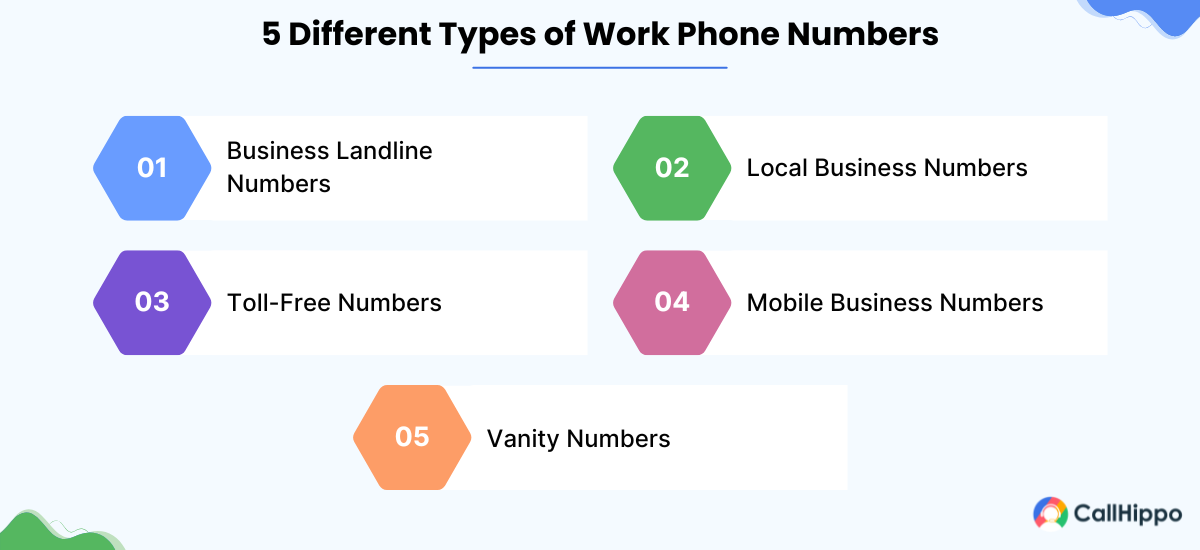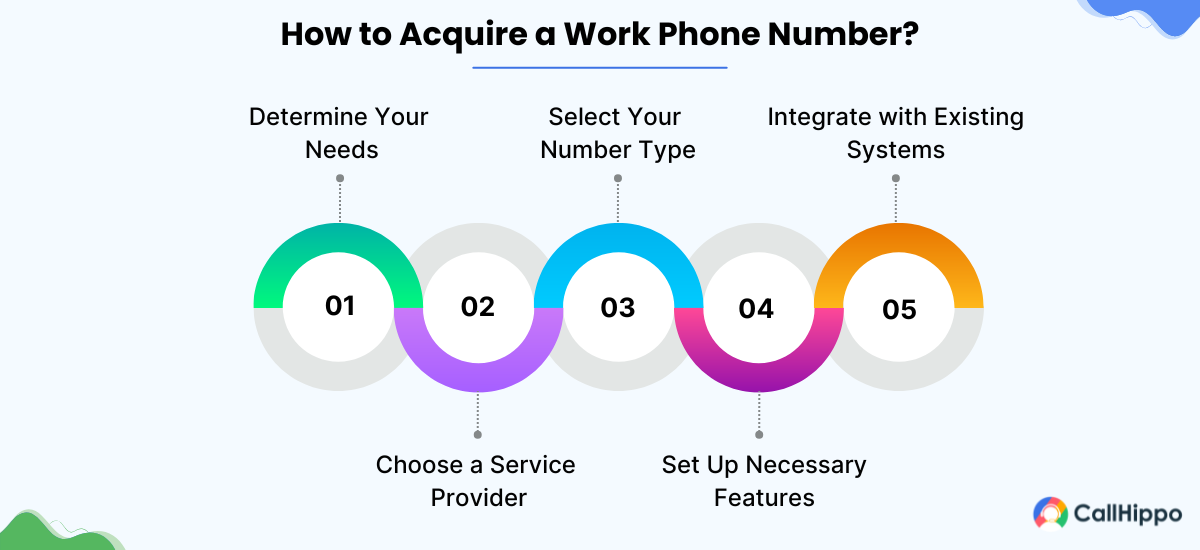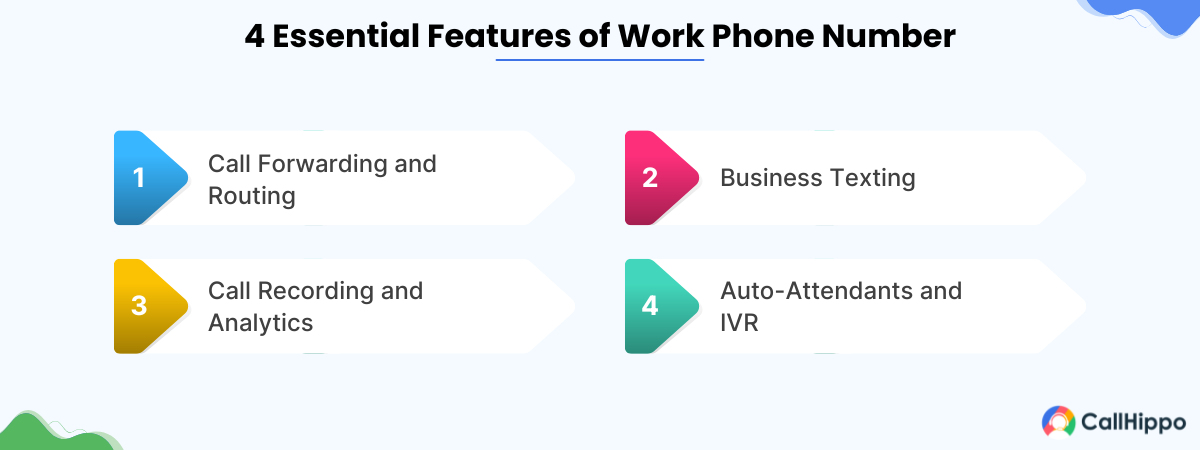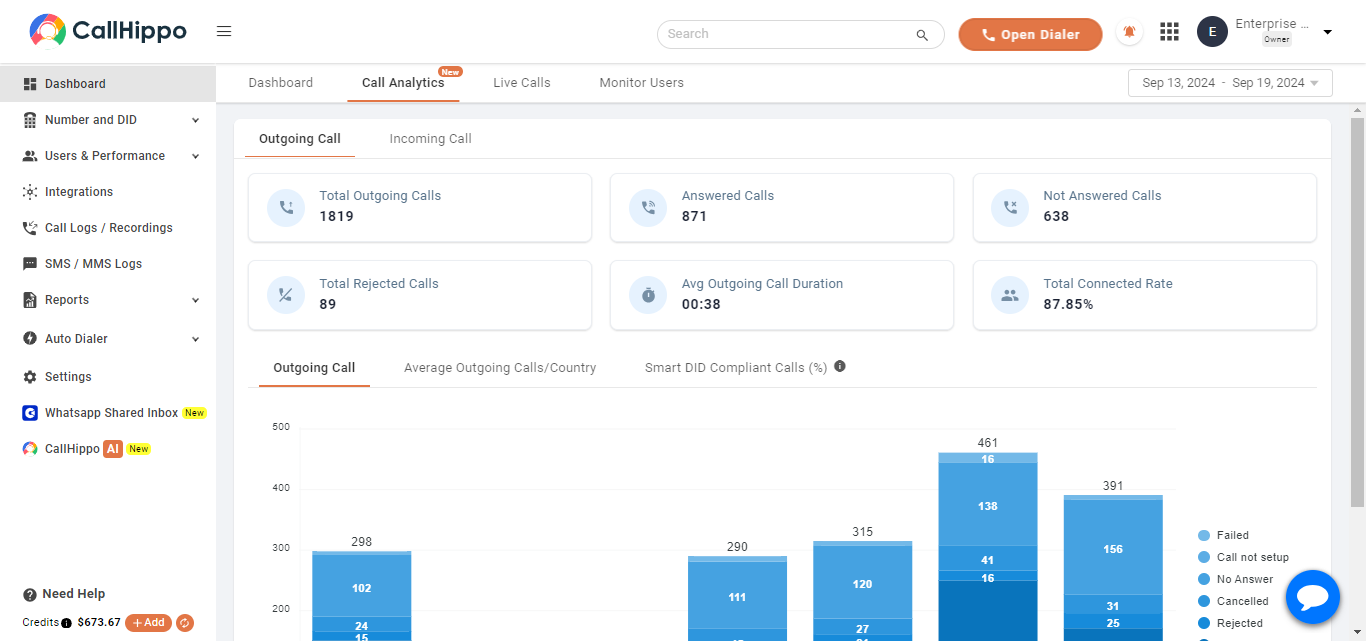Effective communication is the backbone of any thriving business, and a dedicated work phone number plays a crucial role in maintaining seamless interactions. It not only enhances professionalism but also builds customer trust by providing a reliable point of contact. In fact, nearly 80% of consumers consider phone calls important for communicating with businesses.
This underscores the importance of having an accessible and efficient communication channel. In this guide, we’ll explore everything you need to know about work phone numbers and how they can transform business communication.
What Is a Work Phone Number?
A work phone number is a dedicated business number used exclusively for professional communication. It ensures a clear distinction between personal and business calls, helping businesses maintain professionalism and efficiency. Whether assigned to an individual employee or an entire department, a work phone number acts as the primary contact point for incoming calls from clients, partners, and stakeholders.
These numbers can be linked to different phone systems, including landlines, mobile phones, or VoIP-based solutions, allowing employees to handle business interactions seamlessly.
For example, a sales executive might have a dedicated business number that rings on both their office phone and mobile device, ensuring they never miss crucial incoming calls from potential clients.
Companies often use different types of work phone numbers based on their needs. A local business number helps establish a strong presence in a specific region, while toll-free numbers make it easier for customers to reach out without incurring call charges.
Virtual phone numbers offer flexibility, enabling remote teams to stay connected from anywhere.
By using a dedicated work phone number, businesses can streamline business calls, enhance customer trust, and improve overall communication efficiency, ensuring a more organized and professional approach to client interactions.
Types of Work Phone Numbers
There are various types of work phone numbers tailored to different business needs. From traditional landlines to virtual and toll-free numbers, each type offers unique benefits to enhance communication and customer accessibility.

Let’s understand them in detail:
1. Business Landline Numbers
A business phone number linked to a landline is a fixed telephone connection installed at a company’s physical location. These numbers are known for their reliability, call clarity, and consistent service, making them ideal for businesses that need a stable communication channel.
Since landlines do not rely on an internet connection, they offer uninterrupted service, even in areas with poor connectivity. Businesses that want to establish a strong professional presence often use landline phone numbers.
For instance, a law firm might prefer a business landline to project trust and credibility to clients.
Additionally, business phone number providers offer advanced features like call forwarding, voicemail, and conference calling, making landlines a valuable communication tool.
However, as businesses shift towards remote work and digital transformation, many are integrating landline numbers with virtual phone numbers for enhanced mobility and flexibility.
2. Local Business Numbers
Local phone numbers are tied to specific area codes, helping businesses establish a regional presence even if they operate remotely. By obtaining a local phone number, businesses can build trust among customers in that area, as people are more likely to engage with companies that appear local.
For example, a nationwide home repair service might use local phone numbers in different cities to attract customers from each region.
These numbers allow businesses to create a local identity while routing incoming calls to a central contact center or mobile devices.
Many business phone number providers offer local numbers as part of their services, making them easily accessible for companies looking to expand their reach.
3. Toll-Free Numbers
Toll-free numbers, typically beginning with prefixes like 800, 888, or 877, enable customers to reach businesses without incurring any charges. These numbers are ideal for customer service and support, as they eliminate the cost barrier and encourage more customers to reach out without hesitation.
A nationwide e-commerce brand, for instance, might use a toll-free business phone number to handle inquiries and complaints from customers across the country.
Many business phone number providers offer toll-free numbers with additional features such as call routing, voicemail, and analytics.
Businesses often integrate toll-free numbers with virtual phone numbers to ensure calls are directed to the right departments or employees, regardless of location.
4. Mobile Business Numbers
A business phone number linked to a mobile device offers flexibility for professionals who are frequently on the move. These numbers allow employees to manage incoming calls and messages outside a traditional office setup, ensuring continuous connectivity.
For example, a real estate agent might use a mobile business phone number to stay in touch with clients while traveling between property showings.
Unlike landlines, mobile numbers rely on an internet connection or cellular network, making them ideal for remote teams, freelancers, and small business owners.
Many business phone number providers offer mobile-friendly solutions, including call forwarding, voicemail transcription, and automated responses to streamline business communication.
Consumers of all ages still prefer phone calls when they need support for complex issues, making mobile business numbers essential for on-the-go professionals.
5. Vanity Numbers
Vanity numbers are business phone numbers customized to spell out a brand name, slogan, or relevant keyword, making them easy to remember.
For example, a car rental company might use 1-800-RENT-CAR to strengthen its brand identity. These numbers serve as effective marketing tools, as they enhance customer recall and encourage more incoming calls.
A business looking to boost its visibility and customer engagement can obtain a vanity number from a business phone number provider. These numbers can be integrated with virtual phone numbers to route calls efficiently, ensuring no customer inquiries go unanswered.
With the right setup, vanity numbers help businesses improve customer reach, marketing effectiveness, and overall communication strategy.
How to Get a Work Phone Number?
Getting a work phone number is a simple yet crucial step for establishing a professional communication line. The process for selecting a work phone number involves selecting a provider, choosing a suitable plan, and configuring features like call forwarding or voicemail.

Here’s a step-by-step guide to help you set up your work phone number:
1. Determine Your Needs
Before setting up a work phone number, take a moment to assess your business’s communication needs. Think about the nature of your services, your target audience, and the geographical area you serve.
For example, a local bakery might opt for a local phone number, while a nationwide tech company could benefit from a toll-free number to reach customers across the country.
2. Choose a Service Provider
Select a reliable business phone service provider based on your requirements. Look for a provider that offers flexible pricing plans and features like call forwarding, voicemail, and virtual phone number options.
For instance, CallHippo provides a range of plans designed to suit various business sizes and industries.
3. Select Your Number Type
Depending on your goals, choose between a local number, a toll-free number, or a vanity number. Local numbers help create a connection with specific regions, while toll-free numbers are great for customer service lines.
Vanity numbers, like 1-800-FLOWERS, are memorable and can help boost brand recognition.
Some providers, like CallHippo, even offer virtual phone numbers that can be forwarded to multiple devices, giving you flexibility in handling calls.
4. Set Up Necessary Features
Once you’ve selected your phone number, make sure to configure essential features to streamline your communication.
Features like call forwarding, voicemail, and auto-attendants will ensure that calls are routed efficiently and your customers have a smooth experience when reaching you.
5. Integrate with Existing Systems
For seamless communication, make sure your new work phone number integrates smoothly with your current business systems, such as your CRM and email platforms.
This will help you track customer interactions and provide a better experience for your clients.
Choosing the right work phone number is crucial for establishing a professional image and ensuring seamless communication with clients.
Work Phone Number vs. Personal Number: Why You Need to Separate Them
Separating your work phone number from your number is essential for maintaining professionalism, improving work-life balance, and ensuring secure communication.
Here’s why it’s important to keep them distinct:
1. Access to Business-Grade Features
A dedicated work phone number unlocks a range of advanced features that personal numbers simply cannot offer. With a business phone number, you can access tools like call analytics, which track important data such as call duration, frequency, and missed calls.
This allows businesses to spot trends and enhance customer interactions. Additionally, features such as auto-attendants and CRM integrations streamline customer service by routing calls to the appropriate department or team, boosting overall efficiency.
For example, a call center can leverage a business phone number with IVR (Interactive Voice Response) to route calls based on the client’s needs, improving satisfaction and service quality.
According to a report by Zendesk, 50% of customers prefer to interact with a company using the phone due to its personal touch and immediacy. This makes business phone numbers a key asset in maintaining excellent customer relations.
2. Better Call Management and Organization
Having separate work and personal numbers helps you manage calls more effectively. With a business phone number, you can set custom voicemail greetings, define business hours, and establish call routing rules to ensure client calls are prioritized.
For example, you can direct incoming calls to a specific team or department based on the time of day or the nature of the request, ensuring that callers receive quick and accurate responses. This professional approach helps avoid confusion and missed opportunities.
A study by RingCentral found that businesses with professional communication tools experienced a 25% increase in customer satisfaction due to improved call management. Efficient call handling not only makes operations smoother but also leaves a lasting positive impression on customers.
3. Improved Work-Life Balance
Having separate work and personal phone numbers plays a crucial role in maintaining work-life balance. With a dedicated business number, you can easily switch off work calls during non-working hours, preventing the intrusion of work into your time.
This is especially important for remote workers and entrepreneurs who might otherwise struggle to separate the two.
A report from Gallup shows that 23% of employees frequently feel burned out, with one of the major contributing factors being the inability to disconnect from work.
By drawing a clear line between work and personal communication, you can protect your time, recharge, and reduce stress, ultimately improving productivity during work hours.
4. Enhanced Security and Privacy
Using a dedicated work number enhances your security and privacy by protecting your personal information. If you need to share your contact number with clients or colleagues, you can keep your number confidential.
In case of employee turnover, having a business number ensures that customer interactions remain uninterrupted, as the number can be transferred to a new employee or team. This maintains continuity and protects both the business and employees from potential data breaches.
According to a study by Verizon, 43% of businesses experienced a data breach in 2020, emphasizing the need for secure communication channels.
By using a dedicated business phone number, you safeguard your details while keeping your company’s communication professional and secure. You can encrypt calls and use multi-factor authentication (MFA) for an added layer of protection.
Features to Look for in a Work Phone Number
When choosing a work phone number, it’s important to consider features that enhance communication efficiency and professionalism. Key features like call forwarding, business texting, call recording, and IVR systems help streamline customer interactions, improve service quality, and separate business and personal communications.

Here are the features explained in detail:
1. Call Forwarding and Routing
Call forwarding and routing allow businesses to manage incoming calls effectively. With this feature, calls can be automatically redirected to different devices or numbers based on predefined rules, ensuring that business calls are never missed.
For example, a law firm can have calls forwarded to a mobile phone or a dedicated phone line after working hours. Toll-free numbers can also be routed to different teams or departments, depending on the caller’s needs.
This flexibility, especially in a virtual phone system setup, ensures that calls are always directed to the right place, whether it’s an office line, mobile, or remote worker.
Businesses can adjust forwarding rules based on time zones, department availability, or priority, keeping business communication professional and uninterrupted while separating personal calls.
2. Business Texting
Business texting enables companies to send and receive text messages through their business phone number. This is ideal for appointment reminders, customer support, and promotional campaigns, allowing businesses to interact with clients using their dedicated phone line.
A business could use text messaging for quick updates or confirmation reminders. For example, a spa sends text reminders to customers about their appointments.
Virtual phone systems support this feature, allowing text messages to be sent and received on different devices, whether at the office or on the go, keeping communication seamless.
Business texting ensures that the line between work and personal calls is clear and helps maintain a professional communication channel.
3. Call Recording and Analytics
Call recording and analytics are essential features for improving customer service and business efficiency. Call recording allows businesses to review customer interactions, which is especially useful for training and quality assurance.
For example, a call center might record conversations to evaluate service levels or assess customer satisfaction. Analytics offer insights into metrics like call volume, call duration, and customer interactions, helping businesses optimize their processes.
For a business using toll-free numbers, this feature can provide valuable insights into how often customers are reaching out and which departments they contact most frequently.
By analyzing this data, businesses can optimize their communication strategy and leverage internet protocol (IP) technologies to improve call handling and service delivery.
4. Auto-Attendants and IVR
Auto-attendants and Interactive Voice Response (IVR) systems elevate business professionalism by greeting callers and efficiently routing them to the right department or person.
For instance, a business with a virtual phone system might have an IVR that allows customers to press options for sales, support, or billing inquiries. This feature, often available with toll-free numbers, can ensure that calls are routed efficiently, even outside business hours, by forwarding calls to different devices or numbers based on time of day or the customer’s need.
By implementing auto-attendants and IVR systems, businesses can enhance the customer experience, maintain professional communication, and separate business calls from personal calls, ensuring that all communications are handled promptly and efficiently.
Get a Smart Work Phone Number with CallHippo
CallHippo offers a robust and flexible virtual phone system that simplifies communication and enhances customer experiences. By providing businesses with a dedicated work phone number, CallHippo helps organizations maintain professionalism while improving their communication strategy.

Here’s how CallHippo’s features can benefit businesses:
1. Multiple Number Options
CallHippo provides various types of phone numbers, including local, toll-free, and virtual options. Whether your business needs a local number to connect with customers in a specific region or a toll-free number to offer a free calling experience, CallHippo offers the flexibility to choose.
2. Advanced Call Management
CallHippo provides key features like call forwarding, Interactive Voice Response (IVR), call analytics, and voicemail. With call forwarding, you never miss an important call, even when you’re on the go.
IVR automatically routes calls to the appropriate department or team, reducing wait times and improving customer satisfaction.
Call analytics give you valuable insights into call performance, allowing you to make data-driven decisions to optimize customer service.
3. Seamless Integrations
CallHippo integrates with popular CRM and helpdesk platforms, allowing businesses to streamline their workflows. Integration with these tools helps businesses manage customer interactions more effectively, track engagement, and maintain a more organized system.
4. Global Presence
CallHippo supports multiple countries, enabling businesses to operate internationally and establish a professional presence in different regions. This global reach ensures that businesses can maintain a consistent and reliable communication channel with customers worldwide.
5. Scalability
CallHippo’s scalable solutions allow businesses to grow without worrying about communication constraints. Whether you’re a small business or a large enterprise, CallHippo adapts to your needs and ensures efficient communication management at every stage of your business’s growth.
By leveraging CallHippo’s advanced features, businesses can enhance communication efficiency, boost customer satisfaction, and establish a professional, reliable phone system that supports long-term growth.
Conclusion
A work phone number is an essential tool for maintaining professional communication, improving customer trust, and enhancing business efficiency. By choosing the right type of business number—whether local, toll-free, or virtual—you can establish a solid business presence and ensure seamless interactions with clients.
Platforms like CallHippo offer smart and feature-rich business phone solutions to help organizations manage their communication effectively. Investing in a dedicated work phone number not only enhances your brand’s credibility but also ensures better call management, security, and convenience.
By leveraging the right business phone system, you can optimize your workflow, improve customer interactions, and set your business up for long-term success.

Let’s Stay in Touch
Subscribe to our newsletter & never miss our latest news and promotions.



